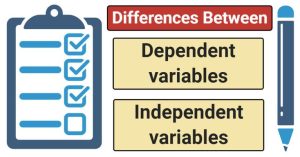What is a Dependent Variable in Science
In science, the dependent variable is a factor or quantity that is observed, measured, or recorded as the outcome or response in an experiment. It is the variable that may change as a result of variations in the independent variable, which is deliberately manipulated by the researcher. The dependent variable is a critical component of scientific experiments because it helps scientists assess and understand the effects of changes in the independent variable.
Key characteristics of the dependent variable include:
It is the variable that you are trying to study or understand.
It is typically found on the y-axis of a graph when visualizing data.
Changes in the dependent variable are considered to be a result of changes in the independent variable.
https://www.youtube.com/watch?v=nqj0rJEf3Ew&pp=ygUnd2hhdCBpcyBhIGRlcGVuZGVudCB2YXJpYWJsZSBpbiBzY2llbmNl
For example, in a scientific experiment examining the effect of different doses of a medication on blood pressure, blood pressure is the dependent variable. The researcher would change the dosage of the medication (independent variable) and then measure how it affects the blood pressure, which is the response (dependent variable).
The purpose of studying the dependent variable is to determine whether there are patterns, relationships, or changes that occur in response to variations in the independent variable. By analyzing the data related to the dependent variable, scientists can draw conclusions, make predictions, and test hypotheses, which are fundamental aspects of the scientific method. Also, reab about Yoga for Flexibility
Understanding Variables
Independent Variable
The independent variable is the one that is intentionally manipulated in an experiment to observe its effect on the dependent variable. It is the cause, the driver of change.
Dependent Variable
In contrast, the dependent variable is what researchers measure and observe as a result of the changes made to the independent variable. It’s the outcome or effect that we seek to understand.
The Role of Dependent Variables in Science
Dependent variables play a pivotal role in scientific research. They provide the basis for drawing conclusions and making inferences. Without dependent variables, experiments would lack purpose and meaning.
Examples of Dependent Variables
Biological Sciences
In biology, dependent variables could include the growth of a plant, the heart rate of an individual, or the number of bacteria in a petri dish. These measurements depend on various factors that researchers manipulate.
Physics
In physics, experiments involving gravitational force might measure the acceleration of an object as the dependent variable. This measurement depends on the independent variable, which could be the mass of the object.
Social Sciences
In psychology, the dependent variable may be the participants’ mood after being exposed to different stimuli. This is influenced by the independent variable, which might be the type of stimulus presented. For more interesting information visit our website newsblinkers.com
How to Identify a Dependent Variable
Identifying the dependent variable is crucial for designing and conducting scientific experiments. It’s the element that you aim to understand better. To do this, ask yourself, “What am I trying to measure or observe in this experiment?”
The Relationship Between Independent and Dependent Variables
The relationship between independent and dependent variables is at the heart of experimental design. The changes in the independent variable directly affect the dependent variable, enabling scientists to draw conclusions about causation.
Controlled Experiments and Dependent Variables
In controlled experiments, researchers manipulate the independent variable while keeping all other factors constant. This ensures that any observed changes in the dependent variable can be attributed to the changes in the independent variable.

Data Collection Methods for Dependent Variables
Qualitative Data
Depending on the nature of the experiment, you may collect qualitative data, such as observations, interviews, or surveys, to measure the dependent variable.
Quantitative Data
Quantitative data, including measurements and numerical values, are commonly used to quantify changes in dependent variables. This allows for statistical analysis and precise conclusions.
Data Analysis and Dependent Variables
Analyzing dependent variables involves assessing patterns, trends, and relationships in the data collected during experiments. Statistical techniques are often employed to make sense of the results.
Challenges in Working with Dependent Variables
Working with dependent variables presents certain challenges, including variability, data collection errors, and external factors that can influence the results. Researchers must address these issues to ensure the validity of their findings.
Importance of Dependent Variables in Scientific Research
Dependent variables are the cornerstone of scientific inquiry. They help researchers test hypotheses, make discoveries, and contribute to the ever-expanding body of scientific knowledge.
Conclusion
In conclusion, dependent variables in science are the measurable outcomes that researchers seek to understand and explain. They are an essential component of the scientific method, providing a foundation for experiments and research. By identifying, measuring, and analyzing dependent variables, scientists can uncover the mysteries of the natural world.
FAQs
What is the difference between independent and dependent variables?
A: The independent variable is manipulated by researchers to observe its effect on the dependent variable, which is the outcome being measured.
Can a variable be both independent and dependent?
A: In some cases, a variable can serve as both independent and dependent, depending on the context of the experiment.
Why are dependent variables important in science?
A: Dependent variables are essential for drawing conclusions and making inferences in scientific research.
How do you identify the dependent variable in an experiment?
A: Identify the element you aim to measure or observe in the experiment. That’s your dependent variable.
What role do dependent variables play in hypothesis testing?
A: Dependent variables help test hypotheses by providing measurable outcomes that can confirm or refute predictions.
